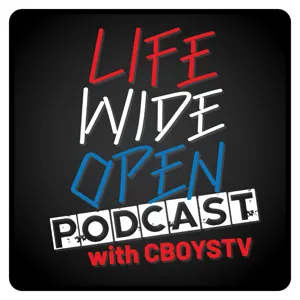Podcast Summary
Transforming everyday routines into adventures: Embrace the unexpected and explore local areas in new ways for deeper community connection and a sense of liberation and excitement
An adventure doesn't have to be a grand, far-off experience. Australian filmmaker Beau Miles shares his belief that everyday routines and local surroundings can be transformed into exciting adventures through intentional risk, difficulty, and quirkiness. From walking and kayaking his 90-kilometer commute to work, reconnecting old rail lines, and even turning meal preparation into a gastronomical adventure, Miles encourages listeners to embrace the unexpected and explore their local areas in new ways. His experiences not only help deepen one's connection to their community but also provide a sense of liberation and excitement. So next time you have an odd idea, don't hesitate, just go for it!
Exploring locally: Making the most of what's nearby: Embrace local adventures for practicality, learning, and enjoyment. Prepare, adapt, and find excitement in the everyday.
The speaker values local adventures for their practicality, learning opportunities, and enjoyment. He aims to explore his local area as a storyteller, saving time and resources by staying close to home. By adding elements of challenge, intrigue, and fun, he turns ordinary activities into meaningful adventures. The speaker also emphasizes the importance of preparation and adapting to limited resources to increase the sense of adventure and self-reliance. His approach is not about watering down the experience, but rather finding excitement in the everyday and making the most of what's available. Whether it's a walk to work or an exploration of a familiar creek, the key is to approach it with curiosity and a willingness to adapt.
Appreciating the World Beyond the Roadside: Walking long distances can teach us to appreciate the world, find resourcefulness, and step out of comfort zones.
Commuting long distances every day can be monotonous and time-consuming, despite the potential enjoyment of the drive. The speaker shared his personal experience of commuting 160 kilometers a day and how he decided to walk to university instead. This experience taught him the importance of appreciating the world beyond the roadside and the challenges of surviving with minimal resources. The walk also highlighted the noisy and dead environment along highways and the need to find water and food opportunistically. Overall, this adventure showed him a new perspective on life and the importance of stepping out of comfort zones.
Exploring on foot vs. by car: Walking immerses you in your environment, leading to new discoveries and a deeper connection to your community
Exploring your environment on foot instead of by car provides a more immersive and present experience. When driving, we're in a bubble focused on our to-do lists and the radio, barely noticing our surroundings. But walking forces us to be fully present and engaged with our environment. This can lead to discovering new things about our town or community that we might otherwise miss. To try this for yourself, simply pick a distance and walk it, allowing yourself to fully engage with your surroundings and the journey. It's a way of traveling that requires more effort, but the rewards are a deeper connection to your environment and a more mindful approach to your daily life.
Embrace new adventures, even if they're unexpected: Trying new experiences, even with potential challenges, can lead to personal growth and a sense of pride. Minimize distractions and involve others to push through.
Sometimes we hold ourselves back from trying new and quirky ideas due to fear of judgment or practical concerns. However, as the speaker shared, trying new experiences can lead to adventures and a sense of pride. He also emphasized the importance of minimizing distractions and involving others to force oneself through. The speaker's decision to kayak to work on a river he thought he knew well turned out to be a longer journey than expected, but it was an adventure that showed him the unexpected realities of the waterway. The efficient roads we have today make traveling by car faster, but rivers follow the path of least resistance and can present unexpected challenges. By taking the risk and trying something new, we may discover new experiences and perspectives.
Embracing the unknown and letting go of control: Stepping out of comfort zone and embracing unpredictability can lead to liberating experiences
Embracing the unknown and letting go of control can lead to liberating experiences. The speaker shares his adventure of kayaking for four days without a set plan, sleeping in various locations, and being at the mercy of nature. He contrasts this with his previous controlled university life and found the uncertainty and excitement of his kayaking journey to be refreshing. Another memorable experience was his day-long trek along an old railroad line in Australia, which he turned into a personal challenge and documented with a film crew. These experiences highlight the importance of stepping out of one's comfort zone and embracing the unpredictability of life.
Encounters with law enforcement during adventures: Approach law enforcement with respect and open communication to clear misunderstandings during unconventional travels. Be aware that certain items could attract unnecessary attention.
When embarking on unconventional adventures, be prepared for encounters with law enforcement. This was a common experience for the speaker during his various walks and paddles across different countries, including Australia. He found that police officers often needed to be approached with a calm and respectful demeanor, and that many misunderstandings could be cleared up through open communication. In Australia, where railway lines are considered public land, the speaker was often let off with a warning after explaining his intentions. However, he also acknowledged that carrying certain items, such as a shovel, could add unnecessary attention and risk to the journey. Overall, the speaker's approach was to remain respectful and flexible, understanding that unexpected encounters with law enforcement were a part of the adventure.
Creating personal experiences through self-made equipment: Limiting resources and making things ourselves can lead to unique and memorable experiences
Turning everyday activities into adventures can add a new level of personal experience and challenge. This was demonstrated through the story of making a paddle from scavenged wood. The teacher, in this case, challenged students to make their own paddles instead of relying on pre-made equipment. This process became a metaphor for the importance of equipment and the commodification of the outdoor sector. The teacher then decided to make a paddle himself using only junk wood he found between his commute to work. By limiting what he could use, he created a more personal and unique experience. This concept can be applied to other activities, including eating. The speaker shared an example of eating his body weight in beans, which brought back memories of the beginning of the pandemic and the need to adapt to new circumstances. Overall, the key takeaway is that by setting limitations and making things for ourselves, we can create more meaningful and memorable experiences.
Exploring the Health Benefits of a Minimalist Diet through a Beans-Only Experiment: Eating a simple staple food like beans for an extended period can lead to health benefits and reveal nutritional deficiencies, inspiring resilience and minimalist living.
The simple act of consuming a staple food like beans for an extended period can serve as a reminder of the resilience and health benefits of a minimalist diet, as inspired by John Steinbeck's literature. The speaker's personal experiment of eating only beans for 40 days led to improvements in cholesterol and weight loss, but also revealed deficiencies in essential nutrients like B12. The unpredictability of the experiment, reminiscent of Steinbeck's characters, added to the adventure and challenged the speaker's perspective on food and health. While the speaker did not follow traditional cooking methods, the simplicity and measurability of canned beans made the experiment feasible and effective for him. Overall, the experience highlighted the potential of embracing a basic, nutritious food source for both physical and emotional well-being.
Exploring the benefits of routine and consistency: Setting goals, sticking to routines, and embracing new challenges can lead to personal growth and improved well-being.
Experimenting with routine and consistency can lead to unexpected discoveries and improvements in various aspects of life. The speaker shared his experience of consuming only beans for two months, which helped him appreciate their versatility and discover new varieties. He also discussed his "mile an hour" challenge, where he completed a task and then ran a mile for 24 hours, which served as a rewarding break from his PhD writing and inspired him to tackle long-neglected tasks. Both experiences demonstrate the value of setting goals, sticking to routines, and embracing new challenges to enhance personal growth and overall well-being.
Turning everyday tasks into adventures: Approaching routine tasks with creativity and challenge can make daily life an adventure, inspiring a sense of accomplishment and fun.
Turning everyday tasks into adventures can lead to a sense of accomplishment and fun. Author Bo Miles shared his experience of completing a list of 50 tasks around his home, which he called his "mile an hour," inspiring others to do the same in their own way. This approach is successful because it's not overly skill-oriented and can be repeated and adapted to individual circumstances. By approaching routine tasks with creativity and challenge, anyone can turn their daily life into an adventure. To learn more about Bo Miles and his work, check out his YouTube channel, Beaumiles, or visit his website, Beaumiles.com. Remember, you don't need to run a marathon to have an adventure – even the smallest tasks can be transformed into something meaningful and enjoyable.













